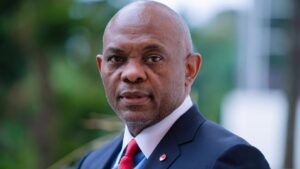Nigeria’s forex crises to persist in 2022 – Report
The Centre for the Promotion of Private Enterprise, an economic think tank, has said the “monetary and foreign exchange policy rigidities” of the Federal Government may disrupt the economic growth of the nation in 2022.
The Central Bank of Nigeria is responsible for monetary and forex policy in the country.
The centre made this known in its ‘2022 Economic Outlook’ report, a copy of which was obtained by our correspondent.
According to the organisation, there is no indication that the nation will shift from its current monetary and foreign exchange policy and this may hamper economic growth in 2022.
The centre said, “Monetary and foreign exchange policy rigidities may also pose a risk to the growth outlook as there are no indications of any significant shift in monetary and foreign exchange policy stance in the near term.
“Consequently, the distortions inherent in the foreign exchange market will persist in 2022. The constraining effect of the high Cash Reserve Requirement on financial intermediation would also persist in 2022 with a dampening effect on growth outlook.”
According to the private sector body, while the economic outlook for the Nigerian economy in 2022 is largely positive with Gross Domestic Product growth to remain at a fragile three per cent, the problem of insecurity will impact significantly on the economy.
It added that the agricultural sector in particular would be affected, as perception of Nigeria as an investment destination continues to diminish.
It said investors would have to grapple with barriers to international trade experienced in the nation in 2021.
The economic think tank said problems relating to the Lagos ports, the traffic gridlock, port congestion, bureaucratic documentation processes, extortions, and the prohibitive charges by terminal operators and shipping companies might continue in 2022.
The CPPE said, “There will be intense electioneering activities in 2022, preparatory to the 2023 elections. This will cause some serious distractions for political office holders at all levels as they struggle to retain power during the elections.
“This will adversely impact the economy and the investment environment as considerable attention and resources are committed to the electioneering activities in 2022. The aggressive drive for revenue by agencies of government will put enormous pressures on investors in 2022.
“Beyond the regular tax authorities, other agencies of government may become more aggressive in their revenue drive. This will constitute an additional burden to investors in 2022.”
According to the organisation, the Federal Government is unlikely to fully remove petroleum subsidy in 2022 because of the 2023 elections.
As a result, it said the economy would have to bear the heavy fiscal burden of this policy, and the full implementation of the PIA as well as the reform of the downstream sector would be affected.
It, however, said the proposed Dangote Refinery might abate some fiscal pressure in 2022 if it comes online.




